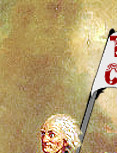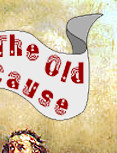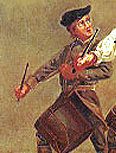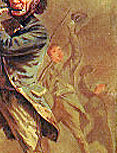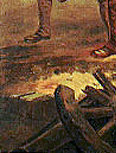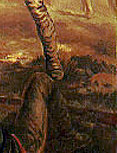PAINE’S
WORLD-OUTLOOK
Paine’s
views were part and parcel of the "American synthesis"
– that particular combination of ideas and themes
from republican theory, early liberalism, English
law, and Protestantism, which Americans fielded in
their war of national liberation. Paine was not deeply
read in any one of these traditions, which made it
easier for him to mix them. With Paine, natural rights,
the "rights of Englishmen," republican virtues,
and more, jostle along, side by side, with no seeming
theoretical anguish. There is also in Paine an incipient
utilitarianism alongside an older rhetoric about the
evils of the Norman Conquest.
A
LAISSEZ-FAIRE LIBERAL SOCIOLOGY
Paine’s
politics rested on a view of society which has been
called "classical liberal exploitation theory."1
The essential insight here is that politics is normally
– and always – the art of plunder. Thus Paine
writes in Common Sense that, "Society
in every state is a blessing, but government, even
in its best state, is but a necessary evil; in its
worst state an intolerable one: for when we suffer,
or are exposed to the same miseries by a government,
which we might expect in a country without government,
our calamity is heightened by reflecting that we furnish
the means by which we suffer…. Wherefore, security
being the true design and end of government, it unanswerably
follows that whatever form thereof appears most likely
to ensure it to us, with the least expense and greatest
benefits, is preferable to all others."2
Small wonder that Ronald Reagan used to quote Paine,
even if he didn’t exactly pursue Paine’s program.
This
is rather open-ended, to say the least, and suggests
ultra-minimal government at best. Thus Paine says
in The Rights of Man: "Great part of that
order which reigns among mankind is not the effect
of government. It had its origin in the principles
of society and the natural constitution of man. It
existed prior to government, and would exist if the
formality of government was abolished. The mutual
dependence and reciprocal interest which man has upon
man, and all parts of a civilized community upon each
other, create that great chain of connection which
holds it together." In commercial and other voluntary
arrangements, society – that is people – takes care
of itself. By contrast, "governments, so far
from being always the cause or means of order, are
often the destruction of it."3
‘CONQUEST
THEORY’ OF THE STATE
Not
unsurprisingly, Paine embraces – and indeed is one
of the original formulators of – what we now call
"the conquest theory of the state." This
was real meaning of the traditional pro-Saxon rhetoric
(shared by no less than Thomas Jefferson) with its
long-standing lament about the Norman Yoke. As Paine
put it, again in The Rights of Man: "It
could have been no difficult thing in the early and
solitary ages of the world, while the chief employment
of men was that of attending flocks and herds, for
a banditti of ruffians to overrun a country, and lay
it under contributions." Here we have Franz Oppenheimer’s
book, The
State, nicely anticipated. Conquerors, "having
parceled out the world and divided it," began
to fight one another: "What at first was obtained
by violence, was considered by others as lawful to
be taken, and a second plunderer succeeded the first."
Here
we have that wonderful word "plunder" –
a concept at the heart of classical liberal political
theory as wielded, for example, by Frederic Bastiat.
Political exploitation rested, in the late 18th
century, on monarchy, "the master fraud which
shelters all others. By admitting a participation
of the spoil, it makes itself friends; and when it
ceases to do this, it will cease to be the idol of
courtiers." The result of the old regime was
"a continual system of war and extortion,"
which impoverished the peoples subject to it.4
As
for those doing the plundering, Paine wrote that "the
origin of aristocracy was worse than foppery. It was
robbery. The first aristocrats in all countries were
brigands. Those of later times, sycophants."
As to feudal land-holding, Paine adds: "It is
very well known that in England (and the same will
be found in other countries), the great landed estates
now held in descent were plundered from the quiet
inhabitants at the Conquest. The possibility did not
exist of acquiring such estates honestly. If it be
asked how they could have been acquired, no answer
but that of robbery can be given. That they were not
acquired by trade, by commerce, by manufactures, by
agriculture, or by any reputable employment, is certain."
The
remedy was a private-property order based on equal
liberty: "As property, honestly obtained, is
best secured by an equality of rights, so ill-gotten
property depends for protection on a monopoly of rights.
He who has robbed another of his property, will next
endeavor to disarm him of his rights, to secure that
property; for when the robber becomes the legislator
he believes himself secure."5
This last point calls to mind the whole recent literature
on "rent-seeking" which, as economist Walter
Block has observed, really ought to be called "plunder-seeking"
or the like.
War
and the war system were central to the organization
of plunder: "It may with reason be said, that
in the manner the English nation is represented, it
signifies not where this right resides, whether in
the Crown or in the Parliament. War is the common
harvest of all those who participate in the division
and expenditure of public money, in all countries."
Governments claimed to provide security for society,
but in fact their operations were "the art of
conquering at home: the object of it is an
increase of revenue; and as revenue cannot be increased
without taxes, a pretense must be made for expenditures.
In reviewing the history of the English Government,
its wars and its taxes, a bystander, not blinded by
prejudice, nor warped by interest, would declare,
that taxes were not raised to carry on wars, but
that wars were raised to carry on taxes."
The Old Right journalist and America First Committee
stalwart John T. Flynn made precisely the same point
with reference to the foreign policy of FDR: "The
one sure and easiest way to command national assent
from all groups for more spending is to ask it for
national defense. The evidence of this is that the
Congress and the nation that [were] howling for economy
only six months ago [are] now talking about military
budgets of monstrous dimensions."6
In
a wonderful insight which applies with certain force
to modern liberal-democratic welfare-warfare states,
Paine writes: "[T]he portion of liberty enjoyed
in England, is just enough to enslave a country by,
more productively than by despotism; and that as the
real object of all despotism is revenue, a government
so formed obtains more than it could do either by
direct despotism, or in a full state of freedom; and
is therefore, on the ground of interest, opposed to
both." Austrian-School economist
Hans-Hermann Hoppe has noted that it is precisely
the more productive liberal societies – like
Britain a hundred years ago or the United States today
– in which government can raise revenues sufficient
to support imperialist policies.7
WAR,
PEACE, AND TRADE
In
Thomas Paine’s view, "War can never be in the
interest of a trading nation, any more than quarreling
can be profitable to a man in business. But to make
war with those who trade with us, is like setting
a bulldog upon a customer at the shop-door. The least
degree of common sense shows the madness of the latter,
and it will apply with the same force of conviction
to the former. Piratical nations, having neither commerce
or commodities of their own to lose, may make war
upon all the world, and lucratively find their account
in it; but it is quite otherwise with Britain…. In
whatever light the war with America is considered
upon commercial principles, it is evidently the interest
of the people of England not to support it; and why
it has been supported so long… is, to me, and must
be to all the reasonable world, a matter of astonishment."8
Further: "If commerce were permitted to act to
the universal extent it is capable of, it would extirpate
the system of war…. The invention of commerce has
arisen since those governments began, and is the greatest
approach toward universal civilization, that has yet
been made by any means not immediately flowing from
moral principles."9
All
nations realized the advantages of trade or they "would
abandon" it. And yet "Mr. Pitt has sometimes
amused himself, by showing what he called a balance
of trade from the custom-house books" – "a
mode of calculation" affording "no rule
that is true, but one that is false."10
In weighing the benefits of commerce, Paine drew the
conclusion that both parties benefit from any exchange
from which force is excluded.
Paine
was especially sound on what is called "economic"
imperialism: "The most unprofitable of all commerce
is that connected with foreign dominion. To a few
individuals it may be beneficial, merely because it
is commerce; but to the nation it is a loss. The expense
of maintaining dominion more than absorbs the profits
of any trade."11
The
attempt to confine or channel trade on the mercantilist
model only made it break out in irregular channels.
Mutual interest and not naval power was the securest
foundation of trade. It must be admitted, however,
that Paine subscribed for a time to ideological imperialism
until he became disillusioned with the French Revolution
and its works. Thus Paine was, briefly, a "social
Bonapartist" who wished to spread the revolution
by military means.
PAINE
AND 200 YEARS’ WORTH OF HINDSIGHT
Paine
was optimistic about the future and the inherent wisdom
of the people under republican forms of government.
He sometimes seems to ascribe all the world’s evils
to monarchy and feudalism and not to government as
such. After two centuries of allegedly popular rule,
we have leave to be more skeptical than Paine was
– and yet we can understand our situation using many
of his insights. We live under an elective monarchy
far more powerful than anything George III ever dreamed
of and a "paper aristocracy" (to quote John
Taylor of Caroline) of government-connected businesses
more powerful and rapacious than England’s 18th-century
Whig Oligarchy. All in all, these are things that
are quite open to a Paineite analysis and critique.
The Anti-Imperialists of 1900 understood that.
Just
the other day I chanced upon a website wherein one
of the usual suspects (I will call his name when I
find the site again) was ranting about how the narrow,
philistine capitalists – left to themselves – would
just trade with people! Precisely Paine’s
point, except for the "connected" businesses
alluded to above. Absent political pressure, propaganda,
and outright coercion, most people "in trade"
would indeed rather buy and sell things rather than
uplift and heal the world – with carpet bombs, subversion,
and intimidation. Few of them would torture the Iraqi
people with sanctions or determine which ethnic expulsions
in the Balkans are "good" and which ones
are "bad." These tradesmen will have to
be shown their place. Yes, your Lordship. By all means,
your Lordship.
Notes

